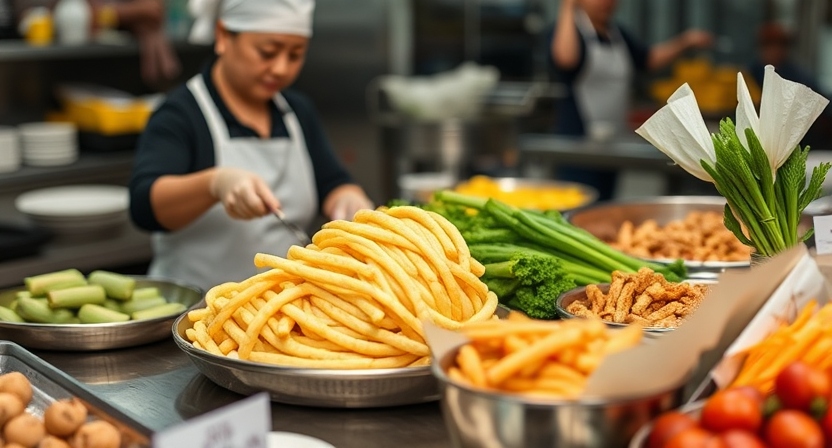- About Us
- Legal Services
- Family Law
- Property
- Marriage
- Immigration
- Contact
- Payments
This is another example of the factory license for another Type 3 factory. We made another example of the Type 3 factory where we explained the AutoParts manufacturer. Here we will now explain the process for the ABC Foods Co. Ltd. Lastly also see the article on the application process for a factory license as well. Speak to us if you are looking for a Thailand English speaking lawyer then contact us.

In this example the company of a mid-sized foreign-invested company. The planning for the factory was to start and build the factory in Chonburi to produce frozen seafood products for export. As an example you will note that the original planning was to employ 100 workers and use machinery with a total power rating of 150 horsepower. This setup will qualify this factory as we know it as a Type 3 factory under the Factory Act B.E. 2535 (1992).
Note that you will need to comply with the food production license. This is issued by the Thai Food and Drug Administration (FDA) and the Food Act B.E. 2522 (1979). Likewise you will note that this license is mandatory for producing food for sale.Likewise you will need to comply with the Good Manufacturing Practice (GMP) standards as well. Lastly also see the steps of the how to open a restaurant in Thailand. Likewise also see the article we wrote on industrial estate in Thailand as well as BOI license Thailand.
The planning started with the business registration of the company. The factory license lawyer will start there. So in this narrative the ABC Foods was registered as a company with the Department of Business Development (DBD). Likewise you will note that the shareholders were primarily foreign, so it had to comply with the Foreign Business Act B.E. 2542 (1999). This means that it will then also need to obtain a foreign business certificate. Lastly the company also applied for BOI Certification (BOI) incentives. This was to benefit from tax exemptions for exporting food products. Lastly also see the article or corporate tax in Thailand as well as personal income tax.
So the ABC Foods was originally planned to be on a piece of leased 10,000 square meters of industrial land. This was done in an industrial zone in Chonburi. Likewise you will note that this will ensure compliance with Section 30 of the Factory Act. The zoning laws mandate that factories must be located in areas authorized for industrial use.
The factory zoning had to be confirmed as well as verified. This zoning classification through the Department of Public Works as well as Town Planning needs to be confirmed. Likewise based on the plans of the factory they decided that a buffer zone was required. This buffer zone was between the factory and nearby residential areas. This was all incorporated into the building plans.
The Type 3 factories tend to have complex manufacturing. Using this as an example we all know that frozen seafood processing can generate wastewater. Likewise for this project you will need to also have an Environmental Impact Assessment (EIA) under the Enhancement and Conservation of National Environmental Quality Act B.E. 2535 (1992). So they will also need to submit the following. There must be a detailed wastewater management plan. This would include an onsite treatment plant with specifications.
Likewise there will also be an odor control issue. This system is to manage waste processing emissions. Likewise the Office of Natural Resources and Environmental Policy and Planning (ONEP) approved the EIA after two months of review and minor revisions to the odor control system.
So the factory license can become very complex when it comes to applying for a factory licenses (Ror Ngor 4) especially the Type 3 factories. So the following would be needed.
• Copy of the company’s registration certificate from the DBD.
• List of shareholders (issued within the last 6 months).
• Tax identification number and VAT certificate.
• Land Ownership or Lease Agreement
• Factory Layout and Designs
• Detailed factory layout and machinery placement plan.
• Engineering designs and diagrams of the factory building.
• Environmental Documentation
• Approved EIA or HIA, if required.
• Waste management plan, including details on wastewater treatment, emissions
• Machinery and Process Details (See the example we made on the AutoParts article)
• List and specifications of machinery (power rating, purpose, and quantity).
• Description of manufacturing processes and materials used.
• Safety Compliance Documents
• Workplace safety plan.
• Fire prevention and emergency response plans.
• Additional Permits (if applicable): This under the Food Act B.E. 2522 (1979) and GMP standards.
• Hazardous substances handling permits.
• Building construction permits (if the factory is newly built).
Should you be looking at starting a factory in Thailand then consider what is needed as well as the cost and locations. You may also look at IEAT-managed industrial estates as an option. Lastly see more on our front page under Thai law firm.
The information contained in our website is for general information purposes only and does not constitute legal advices. For further information, please contact us.
If you need a law firm in Thailand then speak to us online or in Bangkok. We cover a number of issues on this website. This from mutual consent divorce as well as Thailand divorce laws as well. There are a number of issues that you might need assistance with. This can be to translate Thai document to English to signboard tax for your business. Speak to us today for assistance.
